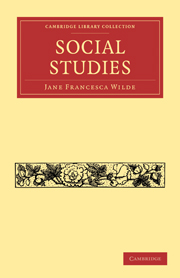Book contents
- Frontmatter
- Contents
- WORKS BY LADY WILDE
- THE BONDAGE OF WOMAN
- GENIUS AND MARRIAGE
- SOCIAL GRACES
- VENUS VICTRIX
- SPIRITUAL AFFINITY
- SUITABILITY OF DRESS
- AMERICAN WOMEN
- THE WORLD'S NEW PHASES
- THE DESTINY OF HUMANITY
- AUSTRALIA (a Plea for Emigration)
- THE VISION OF THE VATICAN
- IRISH LEADERS AND MARTYRS
- THE POET AS TEACHER
- THE TWO ARTISTS: A SKETCH (from the Spanish)
- ‘TERTIA MORS EST’ (from the German,)
SPIRITUAL AFFINITY
Published online by Cambridge University Press: 05 March 2012
- Frontmatter
- Contents
- WORKS BY LADY WILDE
- THE BONDAGE OF WOMAN
- GENIUS AND MARRIAGE
- SOCIAL GRACES
- VENUS VICTRIX
- SPIRITUAL AFFINITY
- SUITABILITY OF DRESS
- AMERICAN WOMEN
- THE WORLD'S NEW PHASES
- THE DESTINY OF HUMANITY
- AUSTRALIA (a Plea for Emigration)
- THE VISION OF THE VATICAN
- IRISH LEADERS AND MARTYRS
- THE POET AS TEACHER
- THE TWO ARTISTS: A SKETCH (from the Spanish)
- ‘TERTIA MORS EST’ (from the German,)
Summary
William Von Humboldt, brother of the great Alexander, and eminent himself as a profound and scientific philologist, seems to have been one of the few men to whom it was given to realise the charm of a true, tender and spiritual affection existing between man and woman, quite apart from all physical attraction, if only their souls were eternally related. His thoughts on the subject, expressed with all the lofty serenity of the philosophic temperament, may be studied with interest in his volume, entitled Letters to a Lady.
Humboldt and the lady to whom they are addressed met only for a few days' intercourse, when both were young. Many years passed, and they held no communication, yet a mutual and ineffaceable impression had been made, and a spiritual relationship was established, entirely unlit by any glow of human sensuous love.
Then a correspondence began that lasted over ten years, during which time they seem never to have met.
Humboldt's letters during this time betray much of the calmness of spirit which is the highest ideal of pagan philosophy. To him this calmness, perhaps, was natural, for he describes himself as all his life singularly free from the fever of the passions. Many of his aphorisms might pass for extracts from the manual of Epictetus, they are so similar in spirit.
- Type
- Chapter
- Information
- Social Studies , pp. 97 - 107Publisher: Cambridge University PressPrint publication year: 2010First published in: 1893

